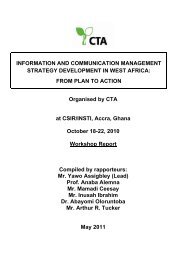Download Workshop Report [PDF] - ICM strategy development - CTA
Download Workshop Report [PDF] - ICM strategy development - CTA
Download Workshop Report [PDF] - ICM strategy development - CTA
Create successful ePaper yourself
Turn your PDF publications into a flip-book with our unique Google optimized e-Paper software.
The following points should be noted for information audits:<br />
• Auditing is the 2 nd step in the assessment stage of doing an <strong>ICM</strong> <strong>strategy</strong> (the SWOT<br />
analysis is the first).<br />
• During the audit be curious, look around asking “What’s this? What’s it used for?”etc.<br />
• It is a voyage of discovery – may unearth hidden assets.<br />
• In the IT assessment, focus on the use of the technology, not the technology itself.<br />
• In the financial assessment, realise that all information (<strong>ICM</strong>) costs, so look at hidden<br />
costs.<br />
• Small expenses can release capacity, e.g. buying a cartridge allows printer to be<br />
used, so assess (plan for) all such costs.<br />
• Need to anticipate all costs before implementing an information project.<br />
• Training (for <strong>ICM</strong>) costs but returns value.<br />
• In the audit, seek participation of all stakeholders in the organisation to raise<br />
awareness of the audit and to get wide support.<br />
• Budget for time and effort required to do the audit.<br />
Summary of Discussions on Information Audits<br />
The following table gives the questions and answers for the main issues raised during the<br />
plenary discussion on information audits.<br />
Question Answer<br />
How often should an information audit be<br />
done? Does is it end with the review or<br />
(introduction) of <strong>ICM</strong>?<br />
How does E-readiness assessment relate<br />
to information audits?<br />
11 | P age<br />
The assumption is that there is no <strong>ICM</strong> policy. The audit<br />
is done at the start of the <strong>strategy</strong> <strong>development</strong> process.<br />
The <strong>strategy</strong> will include monitoring and evaluation to<br />
remain constantly aware of <strong>ICM</strong> status.<br />
It is more or less the same thing. Essentially the IT<br />
assessment phase of the audit – assess potential for<br />
ICT employment.<br />
Who is responsible for information audit? Can use members of the original SWOT analysis team<br />
but need widespread support from management and<br />
operational staff. Some issues may be sensitive so<br />
support is essential. The importance of support from, for<br />
example, the Chief Executive Officer will make a<br />
How far should the audit extend to include<br />
other stakeholders?<br />
Should the audit end (with<br />
implementation)?<br />
Tips for identifying information?<br />
How to sell the audit?<br />
difference to the situation.<br />
One needs to talk to stakeholders to understand how<br />
your organisation fits in (to have a common agenda).<br />
Building trust and cooperation with other stakeholders is<br />
important and this can be done with an open mind and<br />
transparency.<br />
That is depends on the main focus. Set realistic<br />
deadlines as it can take a few weeks or it could take<br />
three months. Be organised to expedite the process.<br />
Be inquisitive, poke your nose into everything and follow<br />
the trail.<br />
Call an initial meeting and discuss the purpose and<br />
value of doing an audit – it’s for us. This also helps<br />
reduce the threat of change it might impose.


![Download Workshop Report [PDF] - ICM strategy development - CTA](https://img.yumpu.com/5365638/11/500x640/download-workshop-report-pdf-icm-strategy-development-cta.jpg)
